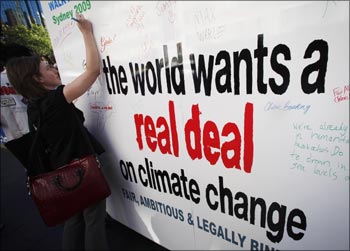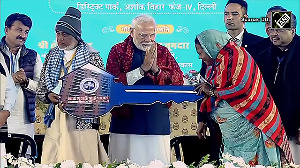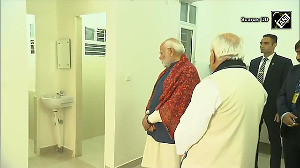 After tough negotiations, the first official draft at the climate meet in Copenhagen has been firmed up which says that developing nations shall take appropriate mitigation actions with the support of finance and technology from the developed world, a key demand advocated by India.
After tough negotiations, the first official draft at the climate meet in Copenhagen has been firmed up which says that developing nations shall take appropriate mitigation actions with the support of finance and technology from the developed world, a key demand advocated by India.
The draft, a copy of which is available with PTI, also provides for the establishment of mechanism to record mitigation actions and also states that national communications, including greenhouse gas inventories, shall be prepared by developing countries and submitted to the COP (Conference of the Parties) every 10 years, which is subject to change.
The draft document prepared by one of the summit's chairmen also urges the rich countries to reduce carbon emissions by 25 per cent to 45 per cent from 1990 levels by 2020, and ranging up to more than 95 per cent below 1990 levels by 2050.
India has in the past rejected the demand to halve world emissions by 2050 unless the developed nations take stronger measures to reduce their emissions.
The draft, which came after four days of hectic negotiations, also says that developing countries can take mitigation actions under Reducing Emissions from Deforestation and Forest Degradation (REDD) in Developing Countries and beyond.
"Developing countries shall undertake nationally appropriate mitigation actions enabled and supported by finance, technology and capacity building provided by developed country parties," the draft says.
India has been maintaining that it was ready to undertake national mitigation schemes to fight against climate change voluntarily and has been pressing for funding and transfer of technology from developed world in this direction.
New Delhi has contended that the funds should be separately earmarked and not come in the form of loans or Overseas Development Assistance.
The draft says the countries shall combat climate change in order to ensure that the 'global average temperature above pre industrial levels ought not to exceed 1.5 or 2 degrees Celsius'.
The maximum temperature is a highly contested issue at the negotiations with rich nations as well as emerging economies like India and China are pushing for 2 degree Celsius.
But small island states and African countries are pushing for 1.5 degree Celsius as Science shows that anything above this temperature would have catastrophic impacts on their countries with many of them sinking in the rising sea levels.
The goal for mitigation actions is bracketed (subject to change) which is in the range of 15-30 per cent by 2020.
Negotiators are expected to produce a legally binding document failing which, a document that captures agreement on key political fronts to tackle climate change that will be worked into a legally binding treaty next year.
The second track of negotiations are being carried out under the Ad Hoc Working Group on Kyoto Protocol that are charged with coming up with a text for the extension of the Kyoto Protocol into its second commitment period following the end of the first commitment period on December 31, 2012 under which industrialised nations are obligated to legally binding carbon emission cuts.
Image: A woman signs a placard asking for a deal in the Copenhagen climate meeting. Photograph: Daniel Munoz/Reuters









 © 2025 Rediff.com -
© 2025 Rediff.com -